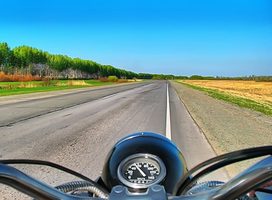The Honda Goldwing GL1000 is equipped with a four-cylinder, water cooled engine. The cooling system consists of four main components: the radiator, water pump, thermostat and electric fan. All four work together to maintain the engine’s proper operating temperature. Repairing a cooling system on the the GL1000 can be done without the need to remove the engine from the frame. With a few simple tools the average home mechanic can successfully make repairs to any of the cooling system components.
Things You’ll Need
- Drain pan
- Metric wrench set
- Slotted screwdriver
- Cross-tip screwdriver
- Rubber hammer
- Snap-ring pliers
- .0002 feeler gauge
- Pan of water
- Heat source
- Thermometer
Radiator
-
Drain the cooling system into a drain pan and remove the two acorn nuts at the top of the radiator. Remove the two black bolts at the bottom of the radiator and pull the radiator slightly forward. Dispose of the used antifreeze in accordance with your local laws.
-
Disconnect the wire going to the electrical fan plug. Loosen the clamps on the upper and lower radiator hoses and pull the hoses free of the radiator. Remove the radiator from the motorcycle.
-
Install the radiator in the reverse order of removal. Place the radiator on the motorcycle. Connect the upper and lower radiator hoses and tighten the clamps securely. Install and tighten the two acorn nuts at the top and the two black bolts at the bottom of the radiator. Refill the cooling system with fresh antifreeze and check for leaks.
Water Pump
-
Drain the engine oil and coolant into a drain pan. Do not mix the oil and antifreeze in the disposal container. Most waste oil recyclers will not accept mixed fluids. Remove the radiator as described in Section 1. Remove the 4 bolts securing the water pump housing to the engine front cover.
-
Pull the water pump off of the engine front cover. Tap the water pump with rubber hammer if required to loosen it. Remove the 2 bolts holding the hose outlet and pull the outlet off the motor. Remove the screws securing the engine front cover to the crankcase and pull the cover off. Remove the snap-ring securing the impeller in the front engine case with a pair of snap-ring pliers. Pull the impeller out of the engine case.
-
Remove all O-rings from the impeller and engine crankcase and dispose of them properly. Install the water pump in reverse order of removal. Install new O-rings on the impeller shaft. Install the impeller into the engine housing and secure with a snap-ring. Install the engine front cover, hose outlet and radiator. Refill the engine oil and antifreeze. Start the motorcycle and check for leaks.
Thermostat
-
Remove the radiator as described in Section 1. Remove the 2 bolts holding the water outlet to the thermostat housing. Remove the water outlet and lift the thermostat out.
-
Test the thermostat by inserting a .0002 feeler gauge between the thermostat valve and seat. Submerge the thermostat into a pan of water with a thermometer. Heat the water and hold tension on the feeler gauge. When the valve opens and the feeler gauge slips out, the temperature should be about 176 to 183 degrees.
-
Replace the thermostat if it opens at the wrong temperature or if it does not open fully. Install the thermostat in the reverse order of removal. Install the thermostat into the housing and install the water outlet. Tighten the two water outlet bolts and install the radiator. Start the motorcycle and check for leaks.
Cooling fan
-
Remove the radiator as described in Section 1. Remove the two bolts holding the fan housing onto the radiator.
-
Remove the three screws holding the fan motor to the bracket and remove the motor. The fan and motor are made into one unit and must be replaced together.
-
Install the cooling fan in reverse order of removal. Fasten the fan motor to the bracket and tighten down the three screws. Attach the fan bracket to the radiator and tighten down the two screws. Install the radiator and start the bike to check for leaks.
Tips & Warnings
- Never work on a hot cooling system. Only work on the cooling system when the engine is cold enough to touch with your bare hand.
- Dispose of used antifreeze promptly. Antifreeze is poisonous to animals and should never be left in a place where it can be ingested by household pets.
